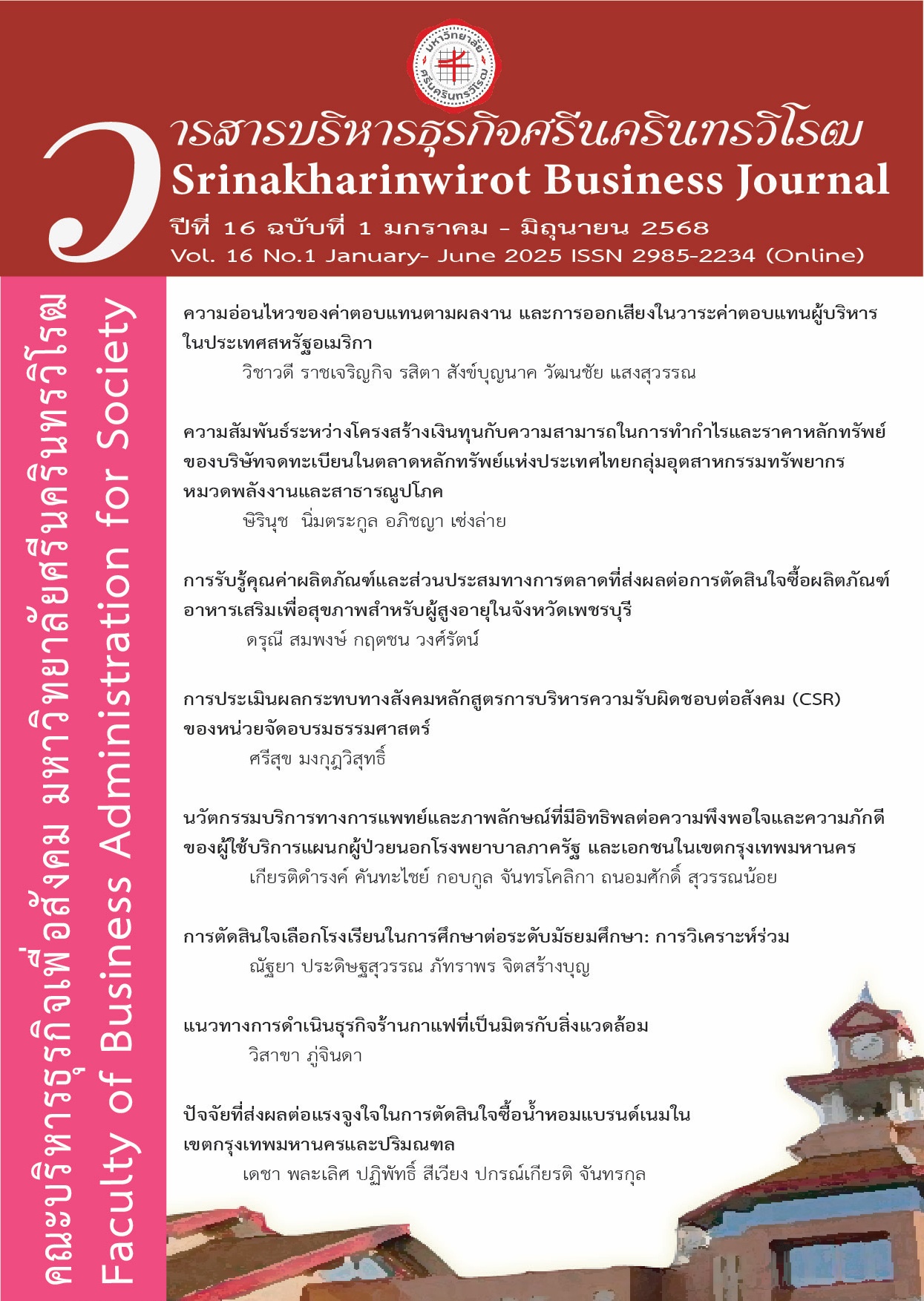SOCIAL IMPACT ASSESSMENT FROM TRAINING COURSE ON CORPORATE SOCIAL RESPONSIBILITY (CSR), BY THE THAMMASAT TRAINING UNIT
Keywords:
Social impact assessment, Social responsibility, Training program evaluationAbstract
This research aimed to evaluate the social impact of a corporate social responsibility (CSR) training program and to explore strategies for enhancing the program. A mixed-methods approach, combining quantitative and qualitative methods, was employed to gather comprehensive data from 166 participants and key informants. The results revealed that since 2018, 282 participants have successfully applied their knowledge from the training at various levels, from individual to international. Consequently, a significant number of CSR projects, totaling 288, have been initiated across 37 provinces, with an estimated additional 166 projects planned for 34 provinces. The positive impacts of the training program were evident at individual, organizational, community, and societal levels. For instance, participants gained greater recognition within their organizations due to their ability to plan projects based on a solid understanding of CSR principles. Moreover, this has helped to reduce conflicts between industries and communities, and improve environmental, economic, and social management.
References
กรมโรงงานอุตสาหกรรม. (2566). แผนปฏิบัติราชการระยะ 5 ปี (พ.ศ. 2566-2570). สืบค้นเมื่อ 5 กันยายน 2566, จากhttps://www.diw.go.th/webdiw/wp-content/uploads/2023/03/plan66-70.pdf
กระทรวงอุตสาหกรรม. (2559). ยุทธศาสตร์พัฒนาอุตสาหกรรมไทย 4.0 ระยะ 20 ปี (2560-2579). กลุ่มวิเคราะห์และติดตามผล, สำนักตรวจและประเมินผล.
การพัฒนาที่ยั่งยืน. (2566). SDG MOVE. สืบค้นเมื่อ 5 กันยายน 2566, จาก https://www.sdgmove.com/aboutsdgs/
กัมปนาท วิจิตรศรีกมล, สุวรรณา ประณีตวตกุล, และ เอื้อ สิริจินดา. (2561). การประเมินผลประโยชน์จากงานวิจัยภายใต้การดำเนินงานของสำนักงานพัฒนาการวิจัยการเกษตรปีงบประมาณ 2560. ศูนย์วิจัยเศรษฐศาสตร์ประยุกต์ คณะเศรษฐศาสตร์ มหาวิทยาลัยเกษตรศาสตร์.
เกศกุล สระกวี. (2564). ผลกระทบทางสังคม (Social Impact Assessment: SIA) ของโครงการพัฒนาการท่องเที่ยวโดยชุมชน: กรณีชุมชนในเขตพื้นที่พิเศษเพื่อการท่องเที่ยว. วารสารพัฒนศาสตร์, 4(2), 129-183.
จปTODAY. (2567). CSR และธุรกิจ: การรับผิดชอบต่อสังคมมีผลต่อความสำเร็จของธุรกิจอย่างไร. Jorportoday.
สืบค้นเมื่อ 5 กันยายน 2566, จาก https://www.jorportoday.com/what-is-csr/
ชมรม CSR THAI CLUB. (2565, 27 ตุลาคม). เอกสารแนะนำชมรม CSR THAI CLUB [เอกสารประกอบการอบรม]. การอบรมหลักสูตรบุคลากรเฉพาะด้านความรับผิดชอบต่อสังคม. วิทยาลัยพัฒนศาสตร์ ป๋วย อึ๊งภากรณ์, มหาวิทยาลัยธรรมศาสตร์.
พิพัฒน์ นนทนาธรณ์. (2553). CSR Corporate Social Responsibility Management การจัดการความรับผิดชอบต่อสังคมขององค์กร: การสร้างข้อได้เปรียบในการแข่งขันอย่างยั่งยืน. บริษัท ธิงค์ บียอนด์ บุ๊คส์ จำกัด.
เพ็ญจันทร์ บัวซาว. (2565). คู่มือการปฏิบัติงาน การจัดทำและดำเนินโครงการฝึกอบรมหลักสูตรบุคลากร เฉพาะด้านการบริหารความรับผิดชอบต่อสังคม ระดับทั่วไป แบบเก็บค่าลงทะเบียน. วิทยาลัยพัฒนศาสตร์ ป๋วย อึ๊งภากรณ์ มหาวิทยาลัยธรรมศาสตร์.
มารุต พัฒผล. (2567). การประเมินหลักสูตรเพื่อการเรียนรู้และพัฒนา (พิมพ์ครั้งที่ 4). จรัลสนิทวงศ์การพิมพ์.
มหาวิทยาลัยธรรมศาสตร์. (2565). แผนยุทธศาสตร์ มธ. ฉบับที่ 13 (พ.ศ. 2565-2570). กองแผนงาน. สืบค้นเมื่อ 10 ธันวาคม 2566, จาก https://planning.tu.ac.th/tuplan
ศรีสุข มงกุฎวิสุทธิ์. (2565). การประเมินผลกระทบทางสังคมของหลักสูตรด้านความรับผิดชอบต่อสังคม (CSR) ของหน่วยจัดอบรมธรรมศาสตร์. วิทยาลัยพัฒนศาสตร์ ป๋วย อึ๊งภากรณ์ มหาวิทยาลัยธรรมศาสตร์.
เศรษฐภูมิ บัวทอง. (2565). โครงการประเมินผลกระทบหลักสูตรการฝึกอบรมเกี่ยวกับงานวิจัย สวก. สำนักงานพัฒนาการวิจัยการเกษตร (องค์การมหาชน). สำนักงานศูนย์วิจัยและให้คำปรึกษาแห่งมหาวิทยาลัยธรรมศาสตร์.
เศรษฐภูมิ บัวทอง และคณะ. (2564). คู่มือการประเมินผลกระทบและผลตอบแทนทางสังคมจากการลงทุนโครงการเพื่อสังคม เพื่อความเข้าใจในหลักการเบื้องต้นและสนับสนุนการปฏิบัติงานขององค์กรเพื่อสังคม. วิทยาลัยพัฒนศาสตร์ ป๋วย อึ๊งภากรณ์ มหาวิทยาลัยธรรมศาสตร์.
สุรัชนี เคนสุโพธิ์. (2560). การฝึกอบรมและพัฒนาทรัพยากรมนุษย์. คณะวิทยากรจัดการ มหาวิทยาลัยราชภัฏอุบลราชธานี.
สำนักงานสภานโยบายการอุดมศึกษา วิทยาศาสตร์ วิจัยและนวัตกรรมแห่งชาติ, และ สำนักงานคณะกรรมการส่งเสริมวิทยาศาสตร์ วิจัยและนวัตกรรม. (2562). นโยบายและยุทธศาสตร์การอุดมศึกษา วิทยาศาสตร์ วิจัยและนวัตกรรม พ.ศ. 2563 – 2570.
อรทัย ศักดิ์สูง. (2567). ทฤษฎีการเรียนรู้ของผู้ใหญ่ ของ มัลคัม โนลส์. สืบค้นเมื่อ 5 กันยายน 2567,
จาก https://www.baanjomyut.com/library/theory_of_malcolm_knowles/index.html
Elkington, J. (1997). Cannibals with Forks: The Triple Bottom Line of 21st Century Business.
Capstone Publishing Ltd.
Krejcie, R. V., & Morgan, D. W. (1970). Determining sample size for research activities. Educational and Psychological Measurement, 30(3), 607–610. https://doi.org/10.1177/001316447003000308
Likert, R. (1932). A technique for the measurement of attitudes. Archives of Psychology, 22(140), 55.
Porter, M. E., & Kramer, M. R. (2011). Creating Shared Value. Harvard Business Review, 89(1/2), 62-77.
White, H., & Raitzer, D. A. (2017). Impact Evaluation of Development Interventions: A Practical Guide. Asian Development Bank.
Downloads
Published
How to Cite
Issue
Section
License
Copyright (c) 2025 Srinakharinwirot Business Journal

This work is licensed under a Creative Commons Attribution-NonCommercial-ShareAlike 4.0 International License.
วารสารบริหารธุรกิจศรีนครินทรวิโรฒ ยินดีรับบทความวิจัยและบทความทางวิชาการด้านบริหารธุรกิจ เพื่อพิจารณาตีพิมพ์เผยแพร่ในวารสาร ซึ่งทัศนะและข้อคิดเห็นใดๆ ในวารสารฯ ถือเป็นความคิดเห็นและความรับผิดชอบโดยตรงของผู้เขียน มิใช่เป็นความคิดเห็นและความรับผิดชอบใดๆ ของคณะบริหารธุรกิจเพื่อสังคม มหาวิทยาลัยศรีนครินทรวิโรฒ ผู้ประสงค์จะนำบทความหรือบทวิจารณ์ใดๆ ไปเผยแพร่ จะต้องได้รับการอนุญาตจากวารสารเป็นลายลักษณ์อักษร ลิขสิทธิ์บทความที่เผยแพร่ทั้งหมดเป็นของวารสารบริหารธุรกิจศรีนครินทรวิโรฒ






